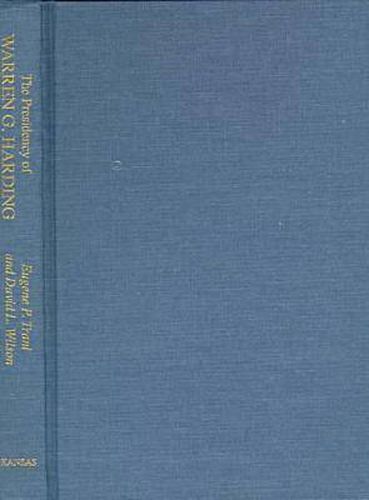Readings Newsletter
Become a Readings Member to make your shopping experience even easier.
Sign in or sign up for free!
You’re not far away from qualifying for FREE standard shipping within Australia
You’ve qualified for FREE standard shipping within Australia
The cart is loading…






This title is printed to order. This book may have been self-published. If so, we cannot guarantee the quality of the content. In the main most books will have gone through the editing process however some may not. We therefore suggest that you be aware of this before ordering this book. If in doubt check either the author or publisher’s details as we are unable to accept any returns unless they are faulty. Please contact us if you have any questions.
In this volume, Eugene P. Trani and David L. Wilson evaluate the presidency of Warren G. Harding by surveying scholarship on the Harding years. Harding–generally considered one of the weakest American presidents–was elected chief executive in 1920, during a time of uncertainty and frustration for many of the American people. The authors assess the critics and defenders of Harding in light of the administration’s accomplishments and failures. Both the strengths and weaknesses of the Harding administration came from the people President Harding selected for high office. Charles G. Dawes accomplished much by implementing sound budgetary practices in the federal government for the first time in history. Herbert Hoover became the dominant figure in the Harding administration, using his influence to advance both domestic and foreign policies. And Charles Evans Hughes proved to be an able, if conservative, secretary of state. Yet the accomplishments of these and other capable men tended to be short-term in nature.
Trani and Wilson describe the widespread corruption and malfeasance in the Harding administration, pointing out the Harding’s erratic judgment of character caused many of his problems as president. His personal habits–philandering, playing poker, and drinking liquor during national prohibition–tainted his reputation and appeared to connect him to the activities of his associates. Tragically, Harding sought to avoid controversy, even if it meant ignoring real problems or evading justice, and thus failed to provide moral leadership for the nation.
Harding and his advisers demonstrated little understanding of the social and economic forces at work in the country and abroad. In the early 1920s, the United States continued the transition from a rural society to an urbanized and industrialized society. Rather than adjusting the government to meet the needs of all segments of an industrialized society, Harding instituted normalcy, an attempt to maintain the values of a rural society rapidly disintegrating under the impact of social and economic change. The few real accomplishments of the Harding administration were buried under scandal. and in the end, Harding must be rated as an ineffective leader at a time when the nation would have been better served by a different, more imaginative approach to government.
$9.00 standard shipping within Australia
FREE standard shipping within Australia for orders over $100.00
Express & International shipping calculated at checkout
This title is printed to order. This book may have been self-published. If so, we cannot guarantee the quality of the content. In the main most books will have gone through the editing process however some may not. We therefore suggest that you be aware of this before ordering this book. If in doubt check either the author or publisher’s details as we are unable to accept any returns unless they are faulty. Please contact us if you have any questions.
In this volume, Eugene P. Trani and David L. Wilson evaluate the presidency of Warren G. Harding by surveying scholarship on the Harding years. Harding–generally considered one of the weakest American presidents–was elected chief executive in 1920, during a time of uncertainty and frustration for many of the American people. The authors assess the critics and defenders of Harding in light of the administration’s accomplishments and failures. Both the strengths and weaknesses of the Harding administration came from the people President Harding selected for high office. Charles G. Dawes accomplished much by implementing sound budgetary practices in the federal government for the first time in history. Herbert Hoover became the dominant figure in the Harding administration, using his influence to advance both domestic and foreign policies. And Charles Evans Hughes proved to be an able, if conservative, secretary of state. Yet the accomplishments of these and other capable men tended to be short-term in nature.
Trani and Wilson describe the widespread corruption and malfeasance in the Harding administration, pointing out the Harding’s erratic judgment of character caused many of his problems as president. His personal habits–philandering, playing poker, and drinking liquor during national prohibition–tainted his reputation and appeared to connect him to the activities of his associates. Tragically, Harding sought to avoid controversy, even if it meant ignoring real problems or evading justice, and thus failed to provide moral leadership for the nation.
Harding and his advisers demonstrated little understanding of the social and economic forces at work in the country and abroad. In the early 1920s, the United States continued the transition from a rural society to an urbanized and industrialized society. Rather than adjusting the government to meet the needs of all segments of an industrialized society, Harding instituted normalcy, an attempt to maintain the values of a rural society rapidly disintegrating under the impact of social and economic change. The few real accomplishments of the Harding administration were buried under scandal. and in the end, Harding must be rated as an ineffective leader at a time when the nation would have been better served by a different, more imaginative approach to government.